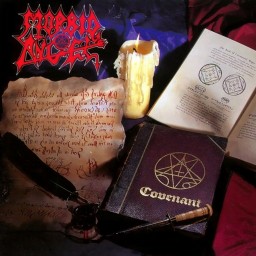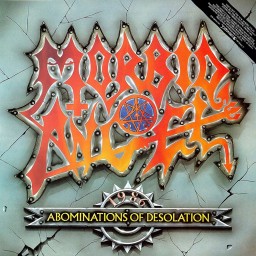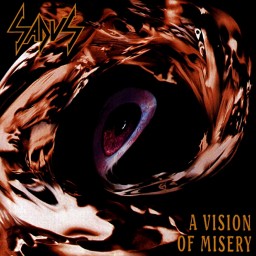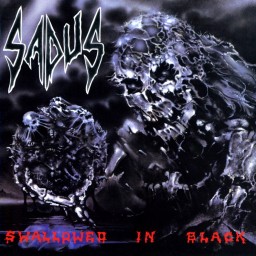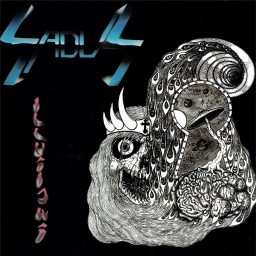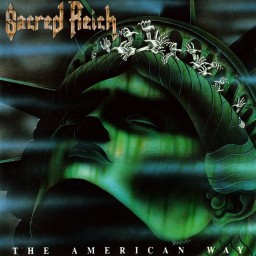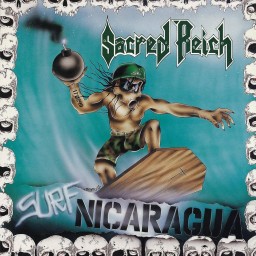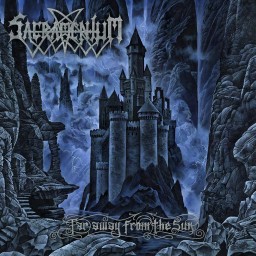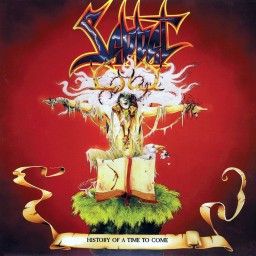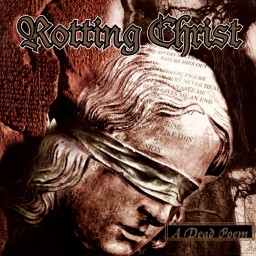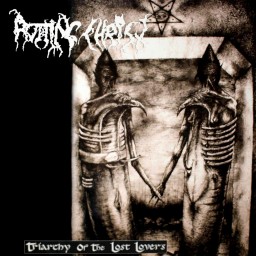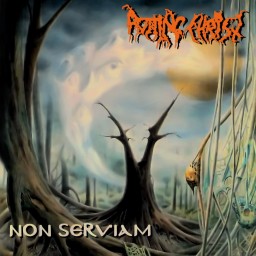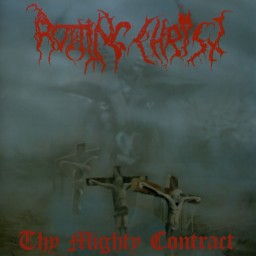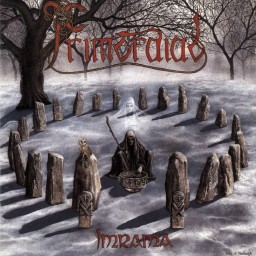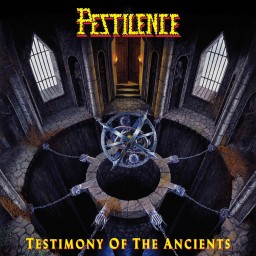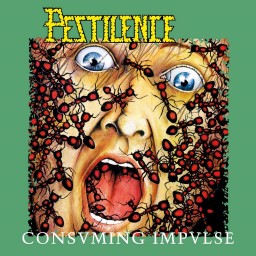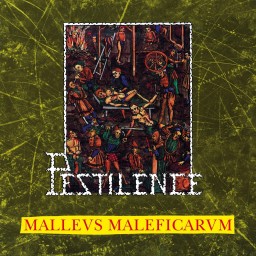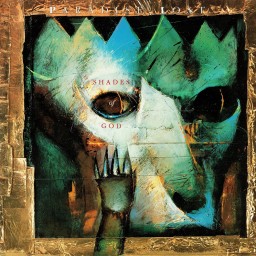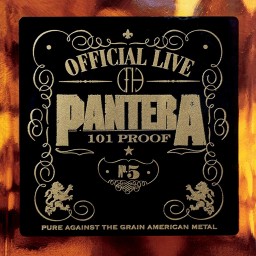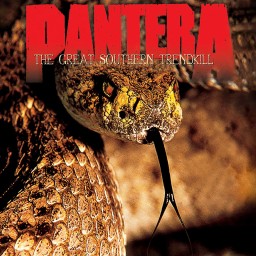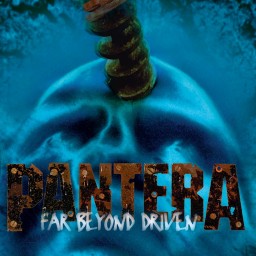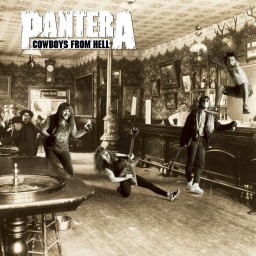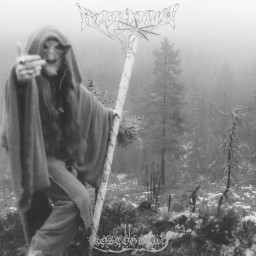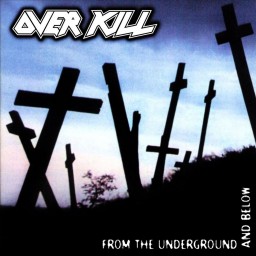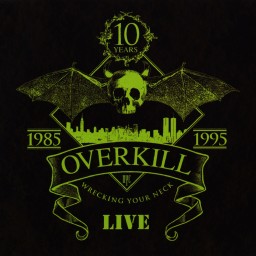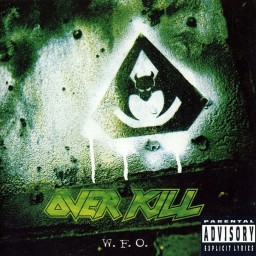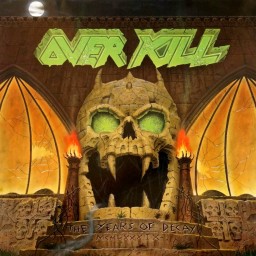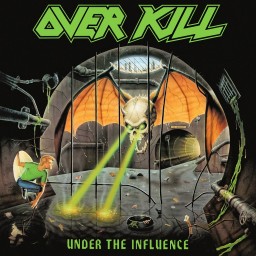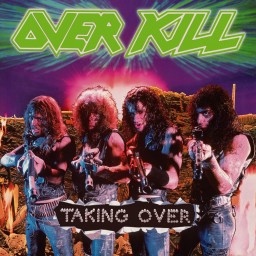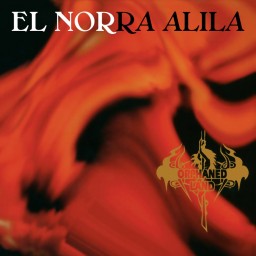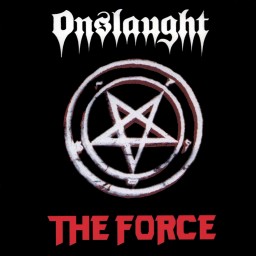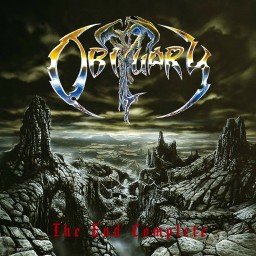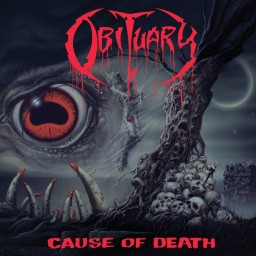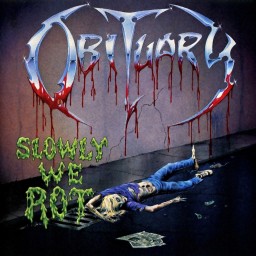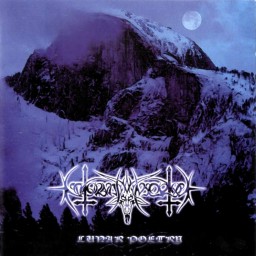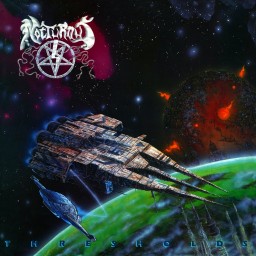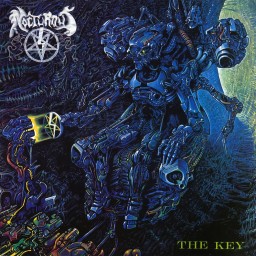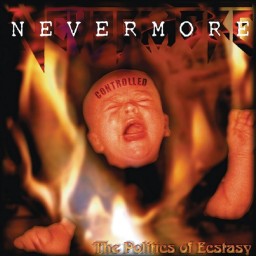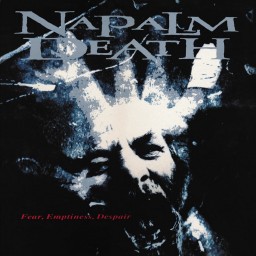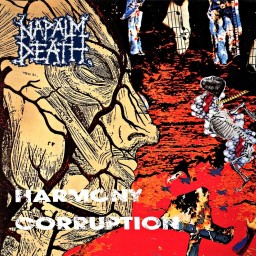Ben's Reviews
Every death metal fan seems to agree that Altars of Madness was an amazing release and fully deserving of classic status. Those same fans also seem to agree that follow up Blessed Are the Sick was almost as good, slowing things down a bit without losing any brutality whatsoever. It's only with the bands third release that things start to get a bit uncertain. From reading reviews below, it's apparent that many were disappointed with Covenant, but I can't for the life of me figure out why. This is completely crushing death metal with fantastic structure, musicianship and sheer brutality. In my opinion, Morbid Angel's reign at the top of death metal (along with Death of course) was certainly not limited to their first two albums. It existed from their debut right up to the very moment that Dave Vincent departed (after fourth album Domination). Almost everything released since that moment has been far below in terms of quality and consistency.
If I break this album down into performances, it's easy to see why it's so effective. Trey's riffs are pure darkness and excitement turned audible. Every single track has riffs that deserve worship while sounding like no other player on Earth. As for his leads, well they've always been incredible and are no different here. Then there's Pete Sandoval on drums. I don't think there's anyone as good as Pete when it comes to double bass kicking and overall his performance is downright godly throughout. Finally, there's Dave! I don't really understand how he made such a difference to Morbid Angel, as a bassist / vocalist wouldn't normally be considered the main writer when it comes to song structures. I can only think that as a front man for the band, he somehow managed to keep the egotistical side of Trey at bay, which is certainly not something that the band have been able to do since Dave's departure (check out his wankery on Heretic for proof). Dave has the best death growl in the business in my opinion. There are plenty more guttural out there, but he always conveys pure, unadulterated passion without losing decipherability (yes, it's a word, I checked) and could almost single-handedly make these songs come to life.
As is the case with just about every album in existence, there is always a negative to be found somewhere. In this case it's the extremely out of place Angel of Disease smack bang in the middle of the album. This is a rerecording, complete with raspy vocals, of a track Morbid Angel released on the bands demo Abominations of Desolation. It's not that it's terrible at all. It just sounds nothing like the rest of the album and is incredibly distracting amongst all the newly written material. If they'd recorded it with the exact same production including vocals, it wouldn't stick out so badly. But I still can't give Covenant anything less than five stars. Any album containing Rapture, Pain Divine, World of Shit, The Lion's Den, Sworn to the Black and God of Emptiness deserves nothing less. I pray to the Ancient Ones (no, not really) that the band can finally create something awesome again now that Dave is back in the band. Please let it be so!
Genres: Death Metal
Format: Album
Year: 1993
Considering the year that Morbid Angel recorded Abominations of Desolation (1986), this certainly deserves a lot of credit for being way ahead of its time. With only two members in the band (Mike Browning - drums and vocals / Trey Azagthoth - all guitars), these US teenagers created an amazingly destructive death metal release filled with evil imagery and great musicianship from the brilliant Trey Azagthoth. As it turned out, they just weren't happy with the sound and shelved the project, waiting for the time when they'd be able to give their vision the production it deserved. While that time would come in 1989 when an incredible full line-up would unleash Altars of Madness onto the world, Abominations of Desolation would finally see the light of day (dark of night?) in 1991.
The question is, does this release hold any interest to fans of the band, considering all but one track (Demon Seed) would be re-recorded on future albums, in many cases under different titles. It's a difficult question to answer really. Firstly, I don't think any of these tracks can be considered superior to the eventual studio album versions. The production, while possibly not as bad as the band seemed to think, certainly lacks the power and clarity of later releases. The band would also make slight changes to all the tracks over the years that I personally think made them a whole lot better. Secondly, Mike Browning's drumming and vocals are just nowhere near the quality that Pete Sandoval and Dave Vincent would bring to Morbid Angel a couple of years later.
I can still put Abominations of Desolation on and enjoy it thoroughly, and I imagine if this were the only release that Morbid Angel ever put out, I (and many others I'm sure) would consider it an absolute classic. While it's difficult to call Abominations of Desolation an essential purchase today, I also find it extremely difficult to suggest that it's not worthy of praise and recognition. Way ahead of its time and containing stacks of Morbid Angel's best tracks in primitive yet still brutal form, this certainly has a solid place in the history and evolution of death metal.
Genres: Death Metal
Format: Album
Year: 1991
To think I'd never heard Sadus until a few months ago! Now I'm working my way through one excellent album after another. An evolution that has taken me from the insanely venomous, purely thrash era of Illusions through to this refined, rather progressive metal, that while still thrash, borders on death metal. The main difference between early Sadus and A Vision of Misery is the band here concentrates far more on musicianship and solid song structures, as opposed to pure, aggressive brutality.
As many below have already mentioned, it's Steve DiGiorgio's bass work that really stands out. While only occasionally taking centre stage (the bass isn't overpowering in the production), if you focus on what Steve's doing, it's hard not to be impressed. He’s one of the most talented bass players in metal. I've also always been a fan of Darren Travis' vocals and his malicious performance is awesome once again on this album.
A Vision of Misery is another entertaining album from this underrated American band. I still don't find it as enjoyable as the mind-blowing Illusions with all its youthful aggression, but it's by far Sadus' most accomplished album that I've had the enjoyment of listening to and one I highly recommend anyone into technical thrash metal add to their collection. Metal Mind's remastered, limited to 2000 digipak is the way to go if you can get your hands on it.
Genres: Thrash Metal
Format: Album
Year: 1992
Sadus’ debut nearly took my head off when I finally got around to checking it out earlier this year. It only ran for about 25 minutes, but it was venomous thrash metal of the finest order, and highly recommended. So, I was excited to pick up their second effort Swallowed in Black. The result is an album that I don’t enjoy quite as much, but is still an entertaining, shredding album that I’ll certainly come back to time and time again.
The main difference between the debut and Swallowed in Black is that the songs (and album for that matter) are generally longer, with an expanded sound. While there are still moments of thrashing madness throughout the album, there’s more of a focus on technical song writing, with an almost progressive feel to some tracks such as Images. One of the main reasons for this is the bass work of genius Steve DiGeorgio which snakes its way throughout the album. But all the musicians really stepped up to the plate for this album and it’s captivating from start to finish. I’ve always loved Darren’s completely messed up, vicious vocals!
Highlights for me are Images, The Wake and Arise. Swallowed in Black is well worth your time if you appreciate the more aggressive side of thrash metal, yet also don’t mind the more progressive side.
Genres: Thrash Metal
Format: Album
Year: 1990
This is shredding! For some reason I'd never managed to hear Sadus until the last couple of weeks. I'd always assumed that they were a technical, almost progressive thrash metal band, but that couldn't be further from the truth. Illusions is ripping, face tearing thrash metal in the style of Kreator and Sodom at their absolute fastest. Steve Di Georgio's bass is awesomely present. The riffs are one after another unrelentingly mosh worthy and Darren Travis' vocals are some of the best I've heard in the genre. He manages to sound completely and utterly psychopathic while keeping things together, like an angry Mille from Kreator. Last but certainly not least, Jon Allen's drumming is insanely good, managing to mix things up at extremely high speed.
The album lasts under thirty minutes, Reign in Blood style. And just as on that classic album, it doesn't feel at all disappointing that it's so short. It just makes you want to press play again. Certain Death, Torture, Hands of Fate and Illusions are all cracking tracks, but there really aren't any low points on what this blistering and thoroughly entertaining album. So glad I finally checked it out!
Genres: Thrash Metal
Format: Album
Year: 1988
Sacred Reich were one of the few bands that tackled serious political lyrics in the thrash metal scene back in the late 80s, early 90s. While I have to say it sounds a bit contrived and naive now, I found it to be extremely fresh when I was a youngster and connected with it. But this is certainly not the only thing of note about these guys. They created tight groove based (think Pantera) thrash metal that was a joy to listen to.
The American Way is where everything came together for them. While the debut was crippled by both production and a lack of identity, this album stood out from the crowd as something different. Phil Rind is a great vocalist with a low gruff style that suits the content perfectly. The drumming is tight and crushing, if not amazing. But it's the riffs that get me moshing every time. Some of these tracks are long and the band knew exactly when to change things up to stop boredom setting in.
Things do get a little preachy at times and 31 Flavors, while a decent attempt to teach metalheads that there are more musical styles to explore out there, stands out like a sore thumb. But The American Way still makes me smile nearly 20 years on and goes down as a solid, enjoyable album that I recommend to all in search of something thrashing yet thoughtful.
Genres: Thrash Metal
Format: Album
Year: 1990
While I find Sacred Reich's debut album Ignorance to be decent enough, it wasn't until The American Way where the band really got their stuff together. With the Surf Nicaragua EP sitting nicely between the two, I wasn't exactly sure which end of the spectrum this would sit. As it turns out, this is a bit of a mixed bag really, and not really a release I will reach for all that often.
With two new tracks, a cover, a re-recorded demo track and two live tracks, this is typical EP fare. The two new tracks are not all that amazing, with Surf Nicaragua ruining some perfectly good riffs by utilizing hugely recognisable and inappropriate surfing music midway through and One Nation not really doing anything to grab the listener. The cover is Black Sabbath's War Pigs, which the band also released as a promo vinyl. It's a poor version of a classic track, and one that would be completely outdone by Faith No More a year later.
Strangely enough, my favourite track off the EP is the re-recorded demo track Draining You of Life with its shredding riffs and supercharged energy. Finally, there are the live tracks which don't really add anything much to the original versions off Ignorance. Death Squad is certainly one of the better tracks off that album though, so its inclusion isn't a complete waste. This EP is a merely average release and doesn't really do enough to demand inclusion in any but the most loyal Sacred Reich fan's collection.
Genres: Thrash Metal
Format: EP
Year: 1988
Fills the gap left by Dissection's absence but doesn't match the quality or consistency of the Swedish legends.
It’s almost impossible not to make comparisons to Dissection when discussing Sacramentum. The way the band mix melodic yet frosty tremolo riffs, raspy black metal vocals and death metal drumming is straight out of the book that Jon Nödtveidt and co. wrote some three years earlier. The only thing missing from Sacramentum’s sound that would complete the replication is the acoustic interludes that were found throughout The Somberlain and as bookends to the classic Storm of the Light’s Bane. The suggestion that the band merely copied an already successful template is not helped by the fact that vocalist Nisse Karlén sounds almost the same as Mr Nödtveidt. All this being said, I’m a firm believer that you can’t get too much of a good thing, and with Dissection not able to produce anything of note after those first two albums (due to incarceration, then commercialisation and then suicide), Sacramentum taking over the reins seems if anything to be extraordinarily good timing. The question that remains of course is whether Far Away from the Sun can match the heights of its obvious influence.
Many fans out there are adamant that the answer to the question above is yes, with many suggesting that it in fact surpasses it. I don’t agree, but that’s not to say that it doesn’t have a lot to offer to fans of melodic black metal. There’s no doubt that this album has some seriously great music and the spirit is where it needs to be from start to finish, but there are a few areas where it doesn’t quite keep up the high standard, making Far Away From the Sun just as far away from Storm of the Light’s Bane. On the positive side, the riffs are absolutely gold throughout the album. It takes a little while for them to sink in (my first couple of listens where a bit underwhelming) but Karlén is a master craftsman of dark, atmospheric melodies and once they get under your skin they refuse to let go. The album doesn’t mess around at all, being a purely metal affair that’s gloriously malevolent and brutal. It undoubtedly succeeds in creating the majestic atmosphere that black metal bands of this style are aiming for.
On the negative side, the drumming is noticeably average at times. When Nicklas Rudolfsson blasts away it’s all perfectly adequate, but whenever he drops the speed his style is distractingly mediocre. It reminds me of Vinterland’s Welcome My Last Chapter for this reason more than any other, as that melodic black metal album also has great death metal style blast beats that are let down by strangely off beats at regular intervals. I also feel that the album doesn’t really take off until the cracking fifth track Cries from a Restless Soul. The first few tracks are decent enough, but the middle section onwards has a consistently excellent quality leaving the album somewhat bottom heavy. Yet while Far from the Sun can’t quite match the polish and consistency of the already-mentioned-too-many-times album above, it’s one that admirably fills the gap left by Dissection’s absence, and I’ll give it a spin every now and then for sure. Highlight tracks are Cries from a Restless Soul, Obsolete Tears and Beyond All Horizons.
Genres: Black Metal
Format: Album
Year: 1996
I've listened to this several times over the past few weeks. Each time I've felt like I'm on the verge of figuring out what everyone seems to love about it, but I never actually have. I've now decided that History of a Time to Come is simply overrated. While this is decent thrash metal with an overly theatrical edge, it simply doesn't get me excited at all. Each song simply washes over me, no matter how hard the vocalist tries to inject some life into the average music.
Speaking of the vocals, they are extremely dominant on this album, with the music just remaining in the background for the majority. When I reach the end of the album, I simply can't remember many riffs at all as they aren't very interesting. Considering how much the vocals reign throughout, it doesn't help that I find his style to be extremely annoying at times. If-a your-a going-a to-a emphasise-a the-a last-a syllable-a of-a every-a word-a, then it's going to get annoying quickly which is what Martin Walkyier does. He also has a bit of a lisp, but now I'm really nit-picking.
It might sound from all of the above that I really dislike History of a Time to Come. It's OK, I guess. The production is adequate, and a couple of tracks are enjoyable such as A Cautionary Tale and For Those Who Died, but overall, I'm just a bit disappointed after all the hype. I'll give the follow up some attention as that gets even higher ratings. I'm not sure if it's all that different but I'll give it a try before I write off Sabbat as there is potential.
Genres: Thrash Metal
Format: Album
Year: 1988
A Dead Poem bears little resemblance to black metal, but still contains some typically cool melodies. Decent but not essential.
It took me quite a long time to appreciate the work of these Greek veterans. Their first two albums (Thy Mighty Contract and Non Serviam) were certainly trying to do something different, but their mid paced melodies just didn’t hit the mark and the rather primitive black metal didn’t do much on its own either. They were the kind of albums where you could easily hear the potential, but the result was less than amazing. Triarchy of the Lost Lovers changed all that with a better production and some memorable melodies, so I was chomping at the bit to check out their next release to find out whether this improvement would continue. Prior to doing so, I noticed that the band had grown from a three piece (Sakis performing guitar and vocals, Jim on bass and Themis behind the kit) to a five piece (Kostas joins as a second guitarist and Panayotis comes in on keyboards). Jim had also been replaced by Andreas who would remain the bassist right through to modern times. I wasn’t all that concerned about all these personnel switches and additions and hoped that the resulting fuller sound would work in Rotting Christ’s favour.
As it turns out, all these changes didn’t completely have the effect I was hoping for. Instead of creating a bigger and better form of the Triarchy of the Lost Lovers album, Rotting Christ dropped most of the black metal sound they’d developed and moved into more gothic territory. The band had always performed mid paced music with a focus on melody, but now the drumming is plodding and simplistic, the riffs have absolutely no venom to them, and the overall mood is more romantic than haunting. It’s not at all surprising to find Fernando from Moonspell and Xy from Samael making guest appearances on A Dead Poem as the album sounds a little bit like a mixture of those two bands in some ways. Xy also had a lot to do with the production of the album and you can hear that in the almost sterile sound. I spent my first few listens shaking my head thinking that I’d spent so much time letting Rotting Christ get under my skin, to the point where I could call myself a fan, only for the band to alienate me straight away. But then something happened around the fourth listen. I started to really enjoy it!
Despite the change in surroundings, the nice Rotting Christ melodies are still here to be enjoyed. Sorrowful Farewell, Among Two Storms, As if by Magic and Semigod are all pretty successful gothic metal tracks that just take a little bit of time to sink in. The critical thing for me was that I came in with incorrect expectations, but once I got past the initial confusion, A Dead Poem turned out to be quite a decent little album. Let’s get one thing straight though! If you ignore the raspy vocals, there is almost nothing representing black metal on this album. Most of the riffs could be straight out of any standard gothic rock entity and the drumming remains passive throughout. In fact, just as with country mates Septic Flesh, the band’s rather blasphemous moniker seems just a little bit silly at this stage of their career. At least they were going by their real names by now instead of immature titles like Necromayhem, Necrosauron and Mutilator. Anyway, as much as I can now find some enjoyment on A Dead Poem, it just doesn’t move me the way Triarchy of the Lost Lovers does. It’s a harmless enough and reasonably effective album, but not essential in any way.
Genres: Gothic Metal
Format: Album
Year: 1997
A cleaner, more melodic Rotting Christ and one that I find far more enjoyable. Very nice indeed!
I've found Rotting Christ to be quite challenging for some reason. Their first two releases receive quite a bit of praise and while I wouldn't say that either Thy Mighty Contract or Non Serviam is a bad album, they just didn't do enough for me to get that excited about. I fully expected to feel the same way about third album Triarchy of the Lost Lovers and was prepared to be quite harsh if it had of been more of the same simplistic, mildly melodic yet not particularly moving black metal. A lot of the band’s fans consider this to be their best work, so if I was ever going to get into Rotting Christ, I figured this would have to be the time. I’ve given Triarchy of the Lost Lovers quite a few listens now and while I’m still not ready to sign up to the Rotting Christ Rock My World Fan Club, I find more to my liking here.
The first thing I noticed was that the production is far clearer for this album than on the previous two. They also injected a fair bit more melody which results in quite a different sound for the band, while not venturing very far from their roots. They keep things very simple and at times repetitious, but this time around the melodies are a fair bit more moving. Black metal is rarely about technical skill, so I’m not opposed to the uncomplicated approach Rotting Christ takes. I appreciate the work of early Samael despite the simplicity of their music. It does need to be said though that some of the riffs on Triarchy of the Lost Lovers are just a bit boring, the drums do nothing more than keep time with the odd burst of speed, and the vocals are monotone and harmless throughout. Yet some of the melodies stay with you long after the album has finished and increase in enjoyment with each subsequent listen, which make me come back for more.
In the end, Triarchy of the Lost Lovers is an album that has grown on me considerably over the last couple of weeks. Once the melodies begin to sink in these tracks really creep up on you until you find yourself humming them throughout the day. I still don’t think any single track is particularly outstanding, but the album is very consistently compelling and does exactly what it set out to do, which has left me pleasantly surprised. It’s a little disappointing to see that the next few albums don’t rate very well on Rate Your Music as I finally seem to be warming to the band, but I’m still looking forward to giving them a go as they may just move even further towards my comfort zone. Highlight tracks for me are King of a Stellar War, Archon, Shadows Follow and The First Field of the Battle.
Genres: Black Metal
Format: Album
Year: 1996
A decent if not incredible melodic black metal album that loses momentum about half way through.
As hard as I try, I can't seem to find much to rave about when it comes to early Rotting Christ albums. Considering the high ratings that these releases consistently get, along with my love of all things black metal, it would appear a given that I'd really get into an album like Non Serviam. But I'm afraid it's all a bit underwhelming to me, being mildly enjoyable, chugging mid paced black metal. Sure, there are quite a few nice little melodies that pop up every now and then, but the vocals, drumming and riffs (while decent enough) are just not exceptional in any way. Considering how many amazing black metal albums came out around the same time (including Ulver, Emperor, Mayhem, Burzum, Enslaved etc.), I'm afraid this just doesn't do enough to be considered essential.
While I clearly am not hugely impressed by Non Serviam, I should point out that it's by no means terrible. The Fifth Illusion, Wolfera the Jackal, Non Serviam and Morality of a Dark Age all start the album off nicely, but by the time Where Mortals Have No Pride is chugging along, I'm starting to get just a little bit bored. I gave the debut Thy Mighty Contract a very generous 3.5 stars and I'm going to do the same thing here. It's obviously an album that many fans enjoy, and I can certainly appreciate that there are some above average things going on throughout the album and some cool little melodies. In the end though, I don't imagine this to be an album I'll be reaching for all that much in the future.
Genres: Black Metal
Format: Album
Year: 1994
Enjoyable early melodic black metal that's just occasionally a bit flat.
This is really the earliest officially melodic black metal album I can come up with. Of course, Dissection released The Somberlain during the same year, but that album is really a very different beast to behold. While Dissection kick started the rather intense Swedish melodic black metal style (along with Marduk) that would influence stacks of bands such as Naglfar and Dark Funeral, Rotting Christ were doing something quite unique. There are no particularly shredding riffs here or screaming vocals. It probably has more in common with the simplicity of early Samael, but with a fair amount of melody added to the mix.
The drumming is completely nontechnical, the vocals are gruff and at times seemingly emotionless, and the guitars switch from chugging rhythms to soaring melodies throughout. They even throw in smatterings of keyboard to add to the already substantial atmosphere. But I have to say at some points things get just a little characterless and mundane. While Transform All Suffering Into Plagues and Exiled Archangels are really enjoyable tracks filled with both darkness and beauty, others such as Fgmenth, the Gift and Dive the Deepest Abyss don't reach such heights, just plodding along without doing anything particularly of note. All up I'd say Thy Mighty Contract is a fine first attempt by Rotting Christ and a decent enough listen every now and then, but they'd certainly release better albums in years to come though.
Genres: Black Metal
Format: Album
Year: 1993
Underrated and too often ignored, Imrama is an atmospheric and unique treasure.
Imrama is really the forgotten Primordial album. Considered correctly to be the most black metal release by this Irish entity, it is generally overshadowed by the more folk metal albums that would follow. I must admit that I also don't think much of Imrama when the name Primordial comes up, but the last couple of weeks that I've spent with the album have proved to me how unwarranted this thought process was. Not only is Imrama an entertaining album, it's not as different to their other albums as it may initially seem.
The band have never really sounded like anyone else. That's partly due to vocalist Naihmass Nemtheanga's unique style, but also due to the folk and Celtic influences that they weave seamlessly into their blackish atmosphere. When I put the album into the context of 1995, there certainly wasn't anything else out there that I can easily compare Primordial to. The black metal riffs are effortlessly atmospheric and when combined with the multiple vocal styles (black metal shriek, spoken word, folky clean), acoustic guitar and Celtic instrumentation, make for a captivating experience.
The production isn't quite as strong as I would like but it's easy to hear all instruments. The drums do get a bit lost in the mix during the faster black metal sections but Imrama is really one of those albums where I stop focusing on individual instruments and just let the result wash over me. It's certainly not the best Primordial album (I think that would be The Gathering Wilderness) but it is most definitely an underrated one. I'm happy that I gave this more attention and will come back to it again far more regularly in the future. Highlights are Fuil Arsa, Infernal Summer, The Fires, To the Ends of the Earth and Awaiting the Dawn.
Genres: Black Metal
Format: Album
Year: 1995
After a couple of reasonably straight forward death metal albums in the late 80s, Pestilence threw a curve ball with this one. While it's still death metal, it's on the lighter side of the genre, instead focusing on technical wizardry and atmospheric interludes. Testimony of the Ancients had an immediate effect on me back in 1991 and I still thoroughly enjoy it 17 years later.
This is the first release to have guitarist Patrick Mameli on vocals and I personally prefer them above ex-member Martin Van Drunen. The guitar work from Mameli and Uterwijk is fantastic throughout. They managed to combine simple, memorable riffs with brilliant technical leads to create a whole new identity for the band. Tony Chow (Atheist and Cynic) takes over bass duty, which also adds to the technicality level as you would expect.
Testimony of the Ancients is filled with classic Pestilence tracks including Twisted Truth, Lost Souls and Presence of the Dead. The band injected little 30 seconds interludes between each track and while a few reviewers below see these as unnecessary, I personally enjoy them, and think they add to the package. If you like your death metal on the more ambitious, experimental side, then Pestilence's later albums are worth giving a shot. This one here in particular.
Genres: Death Metal
Format: Album
Year: 1991
While I do think Consuming Impulse is a slight step up from Malleus Maleficarum, it wasn't the sort of step up I had been hoping for when it was released. The production is definitely better, and there's a little bit more focus than the debut, but overall, it's a bit more of the same. It wasn't until third album Testimony of the Ancients that Pestilence would become a truly great band.
That’s not to say that this album isn't worth your time. Once just like on the debut, it's the riffs that make it enjoyable. Martin's vocals are good but not exceptional, and the drumming is adequate if not amazing. But check out the riffs on The Process of Suffocation, Suspended Animation, Chronic Infection and Out of the Body. Every time I hear them, I can't help nodding my head in utter respect. When it all comes together on this album as it does on those tracks, it makes for an awesome listen.
Yet, in a similar way to the debut, there are some tracks on Consuming Impulse that are merely OK. Opener Dehydrated, The Trauma and Defy the Master for just pass by without making me feel much at all. They're not terrible by any means, but they lack the x factor that would have taken this album from merely enjoyable to essential.
Genres: Death Metal
Format: Album
Year: 1989
I'm a big fan of Pestilence's later albums, particularly Testimony of the Ancients and the severely underrated Spheres. But up until now I hadn't really given this debut album much of a chance. While I can still hear that this is Pestilence, it's a much rawer, chaotic, and nowhere near as experimental Pestilence as the one I'm used to. But every band must start somewhere and Malleus Maleficarum is a decent enough beginning.
The band were pretty much a mix of thrash metal and death metal at this stage, which wasn't all that common. I guess Possessed and Sepultura also fell under that category and I have to say those two bands were slightly ahead in terms of quality back in 1988. But the best thing about Pestilence has always been their guitar riffs and there are plenty to enjoy throughout the 40 odd minutes running time. I do think the guys were rushing things a bit in an attempt to be brutal at times. The shorter, faster tracks, such as Parricide and Extreme Unction, lack any sort of real hooks, and the vocalist seems to be trying to cram words in. As for the lyrics themselves, well they seem to relate to sickness and disease quite a bit, which is fine and all, but I can't say I've ever heard a band sing about Chemo Therapy before. Now that I think about it though, I guess it's something Death might have done around the Human stage.
There are some promising and entertaining tracks on this debut, with Malleus Maleficarum, Subordinate to the Domination and Commandments being the highlights for me. Overall, I quite like the album, but I'm not sure it's a must purchase sort of release. It's just the beginning of what would become a fascinating journey. Check out the band's early 90s albums to hear the band in their prime.
Genres: Death Metal Thrash Metal
Format: Album
Year: 1988
I loved Gothic! It was the first real example of gothic death doom metal, with dark riffs, keyboards, growls and exquisite female vocals all combining to form a captivating and moving album. I was first in line to run out and get Shades of God when it was released and how immensely disappointed I was! Gone was the sound that made Gothic so good. Gone were the gothic touches. Gone were the female vocals. Gone were the death growls. This was basically an entirely new Paradise Lost and one that sounded awkward and far less interesting to my ears. I think I sold Shades of God in disgust and moved on to My Dying Bride and Anathema.
These days I can look at the album more clearly and judge it for what it is. A transition between their death doom roots and the heavy metal approach of years to come. While I can't say I love the album now, I do find some enjoyment from tracks like Mortals Watch the Day and As I Die. Nick Holmes vocals are not very good at this stage, the drumming is merely adequate, and the leads occasionally seem out of key, but there are some great riffs and effective song writing. The band would move ahead with this sound and make much better albums, such as Draconian Times.
Genres: Doom Metal
Format: Album
Year: 1992
A bunch of great Pantera tracks performed live with a couple of decent extras. Nothing more, nothing less.
As is seemingly standard procedure for even reasonably successful bands, Pantera finally got around to releasing a live album in 1997. The title Official Live: 101 Proof is clearly suggestive of an alcoholic substance, which is fitting given the completely redneck persona of the band. There’s not really any way of knowing exactly when this material was recorded and there are many that suggest it’s merely a collection of tracks from separate concerts stuck together with…gasp…edited audience participation. Some take offense to this idea entirely but I personally couldn’t care less. Having seen Pantera live a couple of times back in the day, I can attest to the fact that they do indeed (well, did anyway) kick ass live, and were more than capable of performing as a tight and entertaining band. By the time 1997 came around Pantera had gone through all sorts of drama, not least of all vocalist Anselmo having a secret heroin addiction and subsequent overdose. Yet they’d gained a massive fan base and gone platinum with three of their albums on the journey!
It’s not hard to see why when listening to Official Live: 101 Proof. The 14 live tracks are just one hit after another, and while my personal preference would have been to concentrate solely on the Cowboys from Hell / Vulgar Display of Power era, I can’t deny that just about every tune here rocks hard. The sound is more than adequate, displaying the power of Pantera in a live environment, while giving each member of the band enough clarity to shine. Most importantly, Dimebag Darrell has an awesome guitar sound that allows him to reproduce the creative and very, very heavy riffs that make the band special. Phil’s vocals are filled with power and aggression and apart from on Cemetery Gates where he doesn’t quite nail it, he sounds very similar to on the studio recordings. In fact, the band don’t really mess with the tracks much, pretty much playing them exactly as they were on the albums. I tend to use live albums more like a best of compilation anyway, so it doesn’t bother me all that much, but a few variations here and there might have given it more character.
So why should a Pantera fan purchase Official Live: 101 Proof? It certainly wouldn’t be to listen to Phil’s rants between tracks. We’ve always known that the guy is a tool, but he’s just embarrassing here, trying hard to lift the audience while coming off as an arrogant dumbass in the process. On the plus side, there are two unreleased studio tracks at the end of the live material which are surprisingly very good. Sure, they’re in the style of The Great Southern Trendkill which is by no means their best album, but they are far better than merely unwanted rejects. Where You Come From is the more substantial of the two and while it rocks more than it thrashes and contains one of the worst leads Darrell ever produced, the crushing final minute make it all worthwhile. I Can’t Hide is a two-minute belter that closes the album with typical Pantera hostility, just to remind us that the band were, at least at this stage, a force to be reckoned with. In the end, if you’re a fan of Pantera then there’s no reason why you won’t enjoy this. If you’re not, then what the hell are you reading this for?
Genres: Groove Metal
Format: Live
Year: 1997
A case of the band trying to be everything for everyone that results in them being not much for very few.
I pretty much gave up on Pantera after Far Beyond Driven. After totally lapping up both Cowboys from Hell and Vulgar Display of Power as a teenager, I think I became a bit perturbed by the amount of people at my school that were cranking Far Beyond Driven at their parties and scribbling Pantera across their pencil cases. After all, what was the point of being a rebellious metalhead if every Tom, Dick and Harry were part of the cause. My obvious response was to move on to things more extreme and to label Pantera as lightweight and sell-outs. In hindsight, this attitude was more than a touch immature, but after going back recently to check what I missed from these American rednecks, I have to say I left them behind at the most opportune time.
All the ingredients of prime Pantera are still in place for the majority of The Great Southern Trendkill. Phil is still a very angry man, growling his displeasure at the world with a heck of a lot of conviction. Dimebag Darrell (RIP)still has that completely unique guitar style that combines great shredding riffs with cool groovy ones. Vinnie still belts the hell out of his drumkit while never attempting anything remotely technical. Rex Brown still...well...plays bass. It's apparent at pretty much any stage of the album that it's Pantera you're listening to which I guess shows they haven't departed too far from their successful template. But despite all this familiarity, The Great Southern Trendkill just fails to get the blood pumping consistently.
Pantera still know how to shred. Just as on old favourites such as The Art of Shredding and Fucking Hostile, tracks like the title track and Suicide Note Part II make you want to jump around and smash things up. But there are just too many tracks here that just plod along with no real intensity. 13 Steps to Nowhere really does go nowhere which may very well have been the point, Suicide Note Part I is a crappy attempt at a tear-jerking ballad and the hugely overrated Floods (complete with incredibly tacky thunder sound effects) doesn't hit the mark either. The band were clearly trying to please everyone with The Great Southern Trendkill. It has some of their heaviest work (Phil is screaming his guts out throughout) and some of their lightest. Unfortunately, I think it ends up being an album that pleases very few. I won't be too harsh when rating it as it still has some very good Pantera moments, but it's not a patch on their earlier work.
Genres: Groove Metal
Format: Album
Year: 1996
Inconsistent, frustrating album with several Pantera classics.
I've always considered Far Beyond Driven to be the album where Pantera started their decline. Both Cowboys from Hell and Vulgar Display of Power had spent a massive amount of time in my CD player back in the early 90s and I distinctly remember being somewhat disappointed with this release. The band had just become huge and this is without a doubt the album that would push the band into the mainstream, so perhaps there was an element of individualism that was important to this particular teenager that had been lost with all the hype. I say this in hindsight now, because going back to this album all these years later, I have to say that it's not bad at all. It's still not close to the previously mentioned albums due to its inconsistency, but there's enough pure adrenalin and entertainment on Far Beyond Driven to make it worth checking out.
All the typical Pantera ingredients are in place, with Anselmo's staggeringly brutal vocals, Dimebag's unique squeals and combination of chunky and shredding riffs, Rex's tasty bass grooves and Vinnie's non-technical yet crushingly powerful drumming style. The difference between this album and the previous classics is the unwanted and unconvincing experimentation that the band added and the previously mentioned inconsistency in quality. The first 4 tracks are damn entertaining and at this stage the album more than meets my expectations of a great Pantera album. But Good Friends and a Bottle of Pills is frickin’ awful. It would be bad enough with the sleazy, bassy sections that stand out dramatically from the rest of the album, but then the high feedback, screaming motherfucker sections have me reaching for the skip button faster than you can say "get off the drugs". Hard Lines, Sunken Cheeks is reasonable enough, but way overlong at 7 odd minutes.
The rest of the album continues with this hit and miss quality. Use My Third Arm is one of the highlights of the album in my opinion and Slaughtered, Shredding Skin and Throes of Rejection are all decent enough, but 25 Years takes too long to get anywhere and Planet Caravan is an ill chosen Black Sabbath cover to finish the album on a complete low point. All in all, I have to say that Far Beyond Driven has enough going for it to have a place in any Pantera fans collection, but it's a frustrating experience worth having only once you've played their more acclaimed albums to death (as I have). Highlights for me are Becoming, 5 Minutes Alone and Use My Third Arm.
Genres: Groove Metal
Format: Album
Year: 1994
While this may be Pantera's 5th album, it's their first real thrash metal album, leaving behind the glam metal that they produced throughout the 80s. And what an album it is! The band found this sound out of nowhere, with Dimebag Darrell's unique guitar sound being the backdrop for an awesomely grooving machine. Whatever you think of Phil Anselmo, he's an incredible metal vocalist. Add to this Vinnie's crunching drums and Rex Brown holding up the low end and you've got one monstrous band that would crush all before them. At least they would for a few years anyway.
Seriously heavy riffs are combined with more shredding ones, slower structured tracks are combined with shorter brutal ones, this album is damn entertaining from start to finish and full of great musicianship and song writing. Highlights for me are the title track, Cemetery Gates (of course), Primal Concrete Sledge, Medicine Man, The Sleep and the Art of Shredding, but there's nothing resembling a bad track on Cowboys from Hell. I can put this on today 18 years later and it still gets me moshing around like a mad man. Really glad I saw them live a couple of times in my youth before Dimebag's tragic death.
Genres: Groove Metal
Format: Album
Year: 1990
A massive, well performed black metal album from a dedicated, intriguing individual.
I have to say, listening to Arckanum’s Kostogher release and studying the background behind the band has been rather educational. I always try to get some idea behind the ideology of bands before reviewing them and am often surprised at the tidbits of information that come out of all the research, but nothing prepared me for the dark journey this album would take me on. Before I get into all that I should mention that Arckanum is a one-man band from Mora in Sweden, with all instruments and vocals being handled by a man named Johan Lahger (aka Shamaatae). While this is the first Arckanum album I’ve checked out, it’s actually the bands second full-length release behind 1995’s Fran Marder album. Rate Your Music will have you believe that 1994’s Trulen should be considered the first Arckanum album, but Johan himself confirms on the official website that it was actually the bands second demo. Nonetheless, it goes without saying that I cannot compare Kostogher to Fran Marder having never heard it, but I can tell you that this album is a hugely dedicated piece of black metal.
There are many reasons why I use the word “dedicated” to describe Kostogher. Firstly, apart from a few minor guest appearances, Shamaatae performs all instruments on the album. While it’s fair to say that this fact is not unusual within the black metal scene, this guy does have one advantage over most bedroom black metal bands. Shamaatae is first and foremost a drummer and unbelievably performed drums for the band Grotesque from the age of 11. Unlike many other one-man bands (Xasthur for example), Arckanum doesn’t rely on a drum machine for percussive duties and the ferocious, skilful performance here really stands out. His guitar and vocal efforts are perhaps less impressive, but they’re more than adequate for this type of hypnotic, atmospheric music. Secondly, the entire album is written in Old Swedish. I personally can’t speak a word of any form of Swedish, but from what I understand, writing lyrics in this ancient language and keeping it grammatically correct is no easy feat. This displays the intelligence and commitment that Shamaatae brings to Arckanum and makes the subject matter more intriguing and well…baffling.
This isn’t your standard pagan themed black metal outfit. Shamaatae is a practicing Chaos-Gnostic, which is basically anti-cosmic Satanism. I had no idea what that meant prior to researching this album so made my way to Google post haste. I won’t attempt to explain what I found in this review as there isn’t any way to simplify what is a complicated belief structure in a couple of lines. I can only say that I’m fascinated as to why anyone that isn’t completely insane would associate them self with such clearly manmade and bizarre fiction (I guess people follow Scientology too, not to mention Christianity). Yet it’s clear that Shamaatae isn’t the only black metal performer that does, with the Adam and Eve of anti-cosmic Satanism’s Genesis-equivalent being named Absu and Tiamat, not to mention some of the anti-cosmic Gods having names such as Asmodeus, Astaroth and Belphegor. Most interestingly, Marduk is the name of a cosmic God, the enemy of Satan, which is surprising given the band Marduk’s satanic themes. Perhaps someone can explain that to me? Anyway, if you want to know more about all this, check out this essay.
Musically Kostogher has a fair bit in common with Burzum, with hypnotic riffs and shrieking vocals throughout, but it also recalls the aggressive nature of Abigor and the epic atmosphere of early Enslaved. The production is very soft, and I really have to turn my speakers up to abnormal levels to enjoy the album. Strangely though, apart from the volume issue, the album’s production is fine for this type of black metal. There isn’t much bass to be heard but the drums, guitars and vocals are all perfectly audible and effective. The biggest qualm I have with Kostogher is that it becomes quite repetitive and just a little bit boring when listened to in one sitting. There are small variations going on including some female vocals (almost howling rather than angelic), atmospheric nature effects and even violins, but the black metal structures do become monotonous over the near 60-minute running time. Overall though the feel of the album and tracks like Skoghens Minnen Vækks, Yvir Min Diupe Marder, Þæn Sum Fran Griften Gangar and Bedrøvelse make Kostogher an album all underground black metal fans should track down. I’m certainly keen for more Arckanum!
Genres: Black Metal
Format: Album
Year: 1997
A refreshing new modern sound for Overkill but with typically inconsistent song writing.
After reviewing all the classic era Overkill albums, (From Feel the Fire through to Horrorscope) I just didn’t feel the need to experience the entirety of their discography. After all, as good as those albums were, there’s not even one of them that I really enjoy from start to finish. The band have a distinct knack for combining fine thrash metal rippers with particularly average ones, so the idea of subjecting myself to another 10 lesser appreciated releases just didn’t fill me with joy. But there’s no denying that Overkill are an important and much-loved band in the thrash metal scene, so I’ll pop in every now and then to see what Bobby Blitz and co. are up to. I skipped 1993’s I Hear Black as it’s widely considered to be their worst release, but I did drop in on W.F.O. to find a typical Overkill release, complete with inconsistent track quality, but with a dodgy production (the bass is distractingly high in the mix). I decided to save myself further frustration by ignoring 1996’s The Killing Kind entirely, despite a positive response from at least a few of their fans.
Which brings me to Overkill’s ninth full length studio album, From the Underground and Below. It’s obvious after just a couple of minutes that there have been some serious changes going on in my absence. A quick search of the net confirms that the band have undergone a rather hefty transformation, with both guitarists departing the band straight after W.F.O. (Rob Cannevino to focus on motorcycle racing and Merritt Gant to spend more time with his family). This huge hole in the band was filled quickly enough, but not by particularly likely candidates. Sebastian Marino had been guitarist for the now infamous Anvil for a few years, so his addition wasn’t all that questionable, but Joseph Comeau’s inclusion was a little more surprising given his history of being a vocalist for power metal band Liege Lord. The only suggestion I can find of him playing guitar at all is on a demo for a band called Ramrod (another power metal entity) where Sebastian and Joseph previously played together, so one can only assume that these two offered their services to the usually riff heavy Overkill as a package deal.
It’s not particularly surprising then that From the Underground and Below is a far less thrashy affair than old school Overkill but considering my love/hate relationship with the band, I was willing to give it a go. The album begins in fine style indeed with It Lives and Save Me showcasing the more modern chunky sound. It brings to mind the likes of Machine Head and Pantera, while also hinting at industrial bands such as Ministry. Bobby’s vocals have lost a bit of whininess too, having a far more vicious tone that I really like, and Comeau’s backing vocals are far better than standard gang style hollers. Yet just when I was thinking that Overkill’s new line-up had come up with an impressive new direction, all the old habits start to creep back in. Genocya and F.U.C.T. are nice enough, but Half Past Dead and I’m Alright are lacklustre with none of the energy that thrash metal demands. Then there’s the atrociously corny ballad Promises that reminds me of some sort of Live Aid “save the world” moment. Disappointingly, what started out as a promising change in approach ends up being just another inconsistent Overkill outing.
Genres: Groove Metal Thrash Metal
Format: Album
Year: 1997
Great sounding and entertaining live album that unfortunately ignores a lot of the band's better work.
Overkill are a band that I've always found enjoyable but have never particularly rocked my world. On almost all their albums there are some excellent thrash metal tracks, but there are always others that drop the ball, causing my feelings for the band to sway as violently as their heads are clearly moshing onstage. Wrecking Your Neck really brings this home for me as my appreciation for these 22 tracks ranges dramatically. But if I review this for its live context, I have to say this is one of the better live recordings out there. The sound is excellent and, in some cases, superior to the studio album (I'm looking at you W.F.O. with your massive bass overkill). Most of all though, it gives the listener a real feeling for what an Overkill concert must be like, which is not something all that easy to achieve.
I must admit that I rarely listen to live albums. I tend to prefer the clarity and focus of studio albums. When I do put one on, I'd really like it to run like a "best of" for that particular band. I can't say Wrecking Your Neck completely satisfies on that level. It focuses very heavily on Horrorscope and W.F.O. while ignoring most the band's early classic releases. With only 6 tracks off the first 5 albums, I think Wrecking Your Neck focuses far too much on the band's recent output, missing the opportunity to crank up some of Overkill's best moments. But I'm probably being a bit harsh on what is a very nice double disc live album from one thrash metal's legendary bands. The performances are perfect, and the audience is clearly into it.
Genres: Thrash Metal
Format: Live
Year: 1995
Not the band's best album by any means, but it's worth a listen or two.
Overkill are one of those bands that I find mildly entertaining, but I can't say I've ever found any of their albums to be amazing. Even my favourite releases by these thrashers, Feel the Fire, Horrorscope and The Years of Decay, have a few dodgy tracks amongst all the great ones. W.F.O. is another case in point where I find myself really enjoying certain parts of the album, only to be cringing and searching for the skip button on the next one. But I guess half a great album is better than none, so I'll take the good with the bad.
The first thing to say about W.F.O. is that the bass is ridiculously high in the mix. It's not even very bassy in that it has a rather clangy sound to it rather than any sort of powerful low presence. But it's extremely hard to focus on anything else at times when the bass is just banging away at my concentration. Anyway, once I get past that, there's quite a lot of typical Overkill work here. Thrash riffs galore, combined with great, solid drumming, Bobby Blitz's unique high-pitched vocals and the bass attack.
But I don't think there are any 5-star, classic tracks on W.F.O. There are several decent ones such as Where it Hurts, The Wait - New High in Lows, They Eat Their Young, Under One and Gasoline Dream. But there's just not enough to make me want to come back for more, particularly when there are so many better albums by this very band. I also have to say that I dislike gang vocals (yes, I'm looking at you Exodus) a lot and there's quite a lot of them on this album (Bastard Nation for example). I guess if you’re a big fan of the band, then there's nothing to suggest you won't love W.F.O. too. If you're unlikely to join the Overkill fan club any time soon, then this isn't going to change your mind.
Genres: Thrash Metal
Format: Album
Year: 1994
I didn't really know what to expect of this album. After really enjoying Feel the Fire I'd been left feeling a bit disappointed by both Taking Over and Under the Influence. I think I've realized that what I enjoy about Overkill is not necessarily what many other fans enjoy. The Years of Decay initially gave me that same sense of disappointment, particularly considering many consider it to be the best album they've ever released. But it turns out this one’s a grower.
When I read other reviews on RYM, it seems a lot of people list Elimination and I Hate as two of the very best thrash metal songs ever. It's these songs that lead me to my initial frustration as I don't rate them at all. It's not until the 10-minute Playing with Spiders / Skullkrusher that this album really takes off for me. So now it's clearer than ever that I like Overkill when they take their time and craft solid lengthy songs and not as much when they thrash about for three or four minutes. The three highlights on The Years of Decay are the aforementioned Playing with Spiders / Skullkrusher, Who Tends the Fire and the title track, which are all over the 8-minute mark. Time to Kill, Birth of Tension and exciting closer E.vil N.ever D.ies are also pretty good.
Genres: Thrash Metal
Format: Album
Year: 1989
While this is clearly Overkill, the same band that releases Feel the Fire and Taking Over, there's just something missing on this, their third album. It's in the song writing department that I feel it doesn't match up to those albums. While there are pretty good riffs popping up throughout the album, I wouldn't put any of the 9 tracks included on a best of Overkill album. The first half of the album, from Shred to Brainfade, are all just throwaway tracks in my opinion. The second half contains some longer, more thought out tracks, such as Drunken Wisdom, End of the Line and Overkill III, that are much better.
Personally, I think each album had become more inconsistent at this stage of the band's career. While many will disagree, I think Taking Over, while decent enough, was less enjoyable than Feel the Fire and then Under the Influence took it a notch further down. Thankfully, they would get better again soon.
Genres: Thrash Metal
Format: Album
Year: 1988
I was pleasantly surprised when I finally got around to spending some time with Overkill's debut album Feel the Fire, so I was excited to get my hands on Taking Over. It's ratings on sites like RYM suggested it would be a whole lot better than the debut and one of the classic thrash albums of the 80s. I have to say I'm a bit underwhelmed by it!
The main problems I have with it are Blitz's vocals on a few tracks and that two or three of the tracks are quite average. I know that Bobby Blitz has always had one of those love it or hate styles but for some reason I find his performance on this album a little unbearable at times, whereas I just didn't feel that way with the debut. He seems to be singing higher quite often and I can't help feeling that tracks like Deny the Cross would be great with a more aggressive style. As for the average tracks, In Union We Stand is fairly crap attempt to make a stadium rousing ballad and Fear His Name and Use Your Head are just not very captivating in my opinion.
But there is also a lot to like on Taking Over. The second half of the album is much more to my liking with great tracks like Powersurge, Electro-Violence and Overkill II finishing things off nicely. I guess I'm not writing the album off entirely and will happily give it a 3.5. I just had much higher expectations!
Genres: Thrash Metal
Format: Album
Year: 1987
A rare if flawed gem of Oriental and Middle Eastern influenced death metal.
If there's one thing I appreciate more and more these days, it's a band that does something out of the ordinary. With most albums I pick up these days sounding like a rip-off of other bands that came before them, it really is wonderful when one comes out of the woodwork that could be confused with no other. It's clearly apparent that Orphaned Land are such a band just by looking at the genre labelling for El Norra Alila on this very site. At the time of this review, it has no primary genres listed as no-one can agree on what it is. The only thing anyone seems to be able to agree on is that it has an element of folk metal, but for every primary genre vote of any sort there is one negating it. So, with all this confusion and indecision, what chance do I have of describing this band’s sound? Well, I'll do my best.
Orphaned Land play Middle Eastern and Oriental influenced death metal. Before you start thinking of other entities that contain such labels (Nile for example), this isn't some American death metal band that have integrated other cultural musical stylings to be unique. The influences here often take centre stage, meaning the term death metal hardly seems fitting for most of the album. Tracks seamlessly integrate traditional Jewish and Arabic melodies with very distinctive sounding drum patterns and wavering clean vocals with chunky death metal riffs and death growls. Instrumental tracks and traditional hymns fill the gaps between the more metal compositions and it all results in an extremely unique and captivating experience, albeit one that will take some time to adjust to.
But that's not where Orphaned Land's individuality ends. The lyrics are almost entirely devoted to God and spirituality. While this may seem a paradox among the more blasphemous realms of death metal and while I personally do not believe in a creator in any way, I can honestly say that the themes work perfectly within the musical expressions on offer here. This isn't some sort of gimmick, nor is it a bunch of Christians tainting the spirit of black metal with arrogant, farcical announcements of eternal pain and suffering. It's a group of men from Israel, for whom spirituality and worship are a large part of their culture. They're also not taking the opportunity to simply ram their beliefs down the listeners throats and are instead discussing the common message that can be found among the three major Abrahamic religions, being Christianity, Islam and Judaism. Regardless of your own take on religion, this is an interesting subject to delve into and the magical music that accompanies the education makes it even more worthwhile.
Sadly, El Norra Alila is not a flawless album. As others have stated before me, its length is daunting to say the least. At just under 70 minutes it does perhaps overplay its hand and there are instances where a little bit of restraint would have made for a more consistent listen. As I've mentioned earlier, I very much enjoy the traditional aspects of the album but tracks such as the five minute Shir Hama'Alot are pushing it. One- or two-minute interludes are one thing, but whole sections devoted to Arabic instrumentation and wailing is another. But this criticism can't come close to ruining what is an amazing achievement. Orphaned Land would go on to create an even better album with Mabool and anyone that enjoys that masterpiece should find a lot to enjoy here too. I may not be thanking God for Orphaned Land, but I'm certainly appreciative of the music they have brought to the world.
Genres: Death Metal Progressive Metal
Format: Album
Year: 1996
It's hard not to hear where this UK thrash metal band found inspiration back in the mid-eighties. The Force has Venom and Slayer's Show No Mercy album written all over it. But those influences are certainly not bad ones to have if you want to create an album that is above all else "metal". And this is very, very metal! Endless thrashing riffs, relentless crunching drumming and soaring metal vocals are the order of the day here.
The main issues I’ve have with the album are the vocalist and the track running times. Firstly, the vocalist is doing is best Tom Araya (Show No Mercy period) impersonation but falls a bit short. I guess I must admit that I’m just not that much of a fan of the heavy metal squealing that bands from the day often included. Check out the singer from Artillery and early Dark Angel for more examples of what I dislike. Secondly, only one track on the album comes in under the six-minute mark. I think that’s fine if the material is highly varied and more suited to other genres such as doom metal. But I find myself getting a bit bored midway through a few of these tracks.
Those complaints aside, I think tracks like Let There Be Death, Flame of the Antichrist and Thrash Till the Death have a lot to offer and this album is nostalgically enjoyable. They don’t win any points for originality, but it’s a solid and entertaining thrash metal album.
Genres: Thrash Metal
Format: Album
Year: 1986
I distinctly remember reading that at one stage, The End Complete was the highest selling death metal album ever. That's no longer the case as Morbid Angel's Covenant went on to take that throne. Nonetheless, I personally can't understand why this album was all that successful. It's certainly not one of the better albums the genre has to offer. It's not even one of Obituary's best albums! I can only imagine that The End Complete was riding on the coat tails of its predecessor, the wonderful Cause of Death, and perhaps reaping the rewards of its rather decent album cover.
The major difference between Cause of Death and The End Complete is James Murphy. His leads on Cause of Death were outstanding and often took merely solid, dark death metal tracks to a totally different level of quality through sheer individual brilliance. His absence on this follow-up isn't merely obvious, it's near disastrous. The leads on this album are simply atrocious! There are certainly some decent riffs throughout the album, but it's generally lacking any sort of passion. In a word, it's boring, and not even Tardy's ever awesome vocals can save it. I'd give this album even less if it wasn't for the mildly entertaining, I'm in Pain and closer Rotting Ways, which is admittedly one of the great Obituary tracks.
Genres: Death Metal
Format: Album
Year: 1992
Cause of Death is hands down the best album these Floridian death metal legends would ever produce. Their debut Slowly We Rot was certainly an enjoyable release that showcased how filthy and brutal, yet groovy and memorable these guys can be, yet Cause of Death took everything they were doing earlier and added one extremely vital ingredient. James Murphy!
Obituary were already a formidable outfit, particularly with John Tardy's incredibly violent, guttural, vocal talent leading the way. They'd already created their identity through Donald Tardy's restrained drums and West's and Peres's dark, evil riffs. But what they truly lacked was the incredibly beautiful lead work that James Murphy brought into the band during his short stint.
Tracks like Infected and Body Bag are great tracks regardless, but his lead work just takes them to a whole new level. Other highlights include Dying, the title track and Memories Remain. Add to all this some fantastic artwork and the fact that all 9 tracks are great, and you get an essential death metal classic. Unfortunately, Obituary would degrade into a very much by the numbers type band that would make it easy to overlook their earlier, more inspired outings. Make sure you don't make that mistake!
Genres: Death Metal
Format: Album
Year: 1990
Although Obituary have turned out to be tiresome over the years, their entrance into the death metal genre was grand indeed. Armed with a vocalist that could tear your face off from 100 metres, these guys unleashed Slowly We Rot onto an unsuspecting scene without any concern for our health or sanity. This was filthy, messed up, death metal with a groove to go. I think along with Autopsy and Carcass, Obituary were hugely influential when it comes to just how grotesque and dirty death metal could get.
The riffs are of the slower end of the spectrum, being dark and malevolent. The leads have never been exceptional for Obituary, apart from when James Murphy was part of the band. But it's without a doubt, John Tardy's vocals that stand out. Many consider him to be the best death metal vocalist out there and he's not far from it. His sound is pure unadulterated anguish and evil, just the way it's supposed to be in this wonderful world of death metal.
It's hard to pick out highlights from the album as generally it's all solid in quality. I do enjoy the first 4 or 5 tracks a touch more than the rest, but the remaining tracks certainly don't drop the ball. Obituary would get better on their next classic Cause of Death, but no death metal fan should go without Slowly We Rot in their collection. It's just one of those important, influential albums that still holds up today.
Genres: Death Metal
Format: Album
Year: 1989
An enjoyable symphonic black metal release that has transcended well beyond its original demo cassette format.
Nokturnal Mortum is an interesting black metal band from the Ukraine. With a dominant symphonic aspect to their sound along with injections of folk instrumentation, they’ve released numerous cool albums since their inception back in 1994. Lunar Poetry is often referred to as the band’s first full-length album but in fact was originally released as demo cassette in 1996. Yet this demo contains no less than 9 tracks totalling over 45 minutes and has since been re-released in numerous formats. But what really separates Lunar Poetry from the average demo recording is the quality of the music. This is enjoyable, proficient symphonic black metal that overcomes a slightly muffled production with memorable melodies and great atmosphere. Black metal is one of the few genres that can benefit from low production values and this album is a good example. It helps that all the instruments remain audible as separate entities, but the muddy sound gives the cold black metal riffs and eerie keyboard work an extra dose of atmosphere that goes a heck of a long way with this style of music.
Munruthel utilizes all sorts of different drumming techniques alongside the typical blast beats and double bass kicking. His percussive style often gives the music a folk-like feel which would be built upon on future albums. Knjaz’s vocals are standard black metal fare, yet the addition of occasional clean vocals is used well throughout. The riffs are not always the main feature with the keyboards often taking centre stage, but whenever they step up, they are very cool indeed. Surprisingly, there are quite a few nice solos on Lunar Poetry which is not something I expect all that often when listening to symphonic black metal, but it all adds up to quite a unique experience. Occasionally the symphonic aspect will enter a zone close to fluffiness (Perun’s Celestial Silver plagiarizes early Cradle of Filth too) but for the most part, this release holds a consistently moody and dark tone that I thoroughly enjoy. Lunar Poetry is a rare case of a demo recording being truly deserving of being heard. Not only that, it’s many Nokturnal Mortum fans favourite release by the band which is not to say their other material isn’t worthy. If you enjoy symphonic black metal, you should check this out! Highlight tracks for me are Lunar Poetry, Carpathian Mysteries, …and Winter Becomes and Ancient Nation.
Important Note: Nokturnal Mortum is generally regarded as a major band in the Eastern Europe National Socialist black metal scene. While I have just given a fair amount of praise to the quality of their music, I’d like to spend some time discussing what the above scene represents, and whether we should distance ourselves from any bands associated with it. I don’t wish to turn my review of Lunar Poetry into a political discussion, but then it’s difficult to talk about Nokturnal Mortum in any detail without raising topics that in turn raise interesting questions. Many argue that praising and promoting bands with controversial ideologies means giving more strength to the ideologies themselves. That’s not something to take lightly considering the morals involved here.
As a fan of extreme metal, I am perfectly used to bands using violent, grotesque imagery along with values that I personally wouldn’t stand behind. Pro-war/violence and anti-religious lyrics are regularly found throughout death and black metal and I generally have no problem with them. A huge majority of the band members that utilize violent, destructive lyrics would never practice the murder and brutality that these lyrics portray. They are simply a tool that helps form the overall mood of the music, and a release for the anger and frustration that is held within both the performers themselves and a fair amount of their audience. As for anti-religious lyrics, I can personally connect with them as I think religions are not only based on fiction and lies, but that they are also harmful to humanity in many ways. Metal is one of the only forms of media that is willing to openly discuss these issues, whether it be through provocative baiting or through thoughtful, intelligent philosophy. But what happens when a band sends a message that is not just a bit of fun or fantasy, but instead holds very serious moral implications?
National Socialism, of which Nazism is a form, is an ideology built upon racism and hatred. White supremacy, racial separatism, anti-Semitism and heterosexism are all part of its philosophy and can all be found within the work of National Socialist black metal bands. I oppose these values entirely and certainly wouldn’t want to be promoting them. Since Nokturnal Mortum are connected to this scene, should I not boycott their music the same way The End Records did by dropping the band back in 2002 once they figured out what the band represented? I would like to hear the opinion of others, but for me, I am simply viewing Nokturnal Mortum’s music as a form of art. There are many forms of art out there that have messages that oppose our own values, and yet we do not avoid experiencing them. If anything, we benefit from the education we receive from them, just as I have benefitted from learning about National Socialism through its involvement in black metal. The key for me is awareness! There is no shame in appreciating art on its artistic merits alone, but it is important to be aware of and to understand its moral implications if one is to remain unaffected by it.
Genres: Black Metal
Format: Album
Year: 1996
I'm a big fan of Nocturnus' debut album The Key. It's mixture of sci fi elements and technically awesome musicianship made for an incredibly unique listening experience. I purchased Thresholds expecting an even better album, but while it's enjoyable, that hasn't turned out to be the case. It's hard to describe why this album doesn't work as well as The Key, particularly as it has mostly the same ingredients in place along with the same flaws.
I guess firstly, the production is really lacking. Everything sounds a bit weak and it really could have done with a crunchier, clearer sound. Mike Browning is still the weakest link with his one-dimensional drumming and average vocals not bringing much excitement with them. But that was the case on The Key as well, yet McNenney and Davis' guitar riffs and leads were just so awesome, and Panzer's keyboard work so atmospheric, that Browning wasn't album to bring the whole thing down. On Thresholds, these musicians are still present and still doing their thing nicely, but somehow the excitement level and atmosphere just isn't there. Tracks like Tribal Vodoun and Arctic Crypt are great but can't come close to classics like Lake of Fire and Destroying the Manger.
All up a bit disappointing, but still a decent technical death metal album with a science fiction spin and some great leads. It's a shame Nocturnus could never meet the quality of their debut. It's so surprising how many bands fail to do so. I guess they run out of passion and creativity or maybe it's the debilitating power of expectation.
Genres: Death Metal
Format: Album
Year: 1992
The Key is such a unique album. Non-one has managed to make an album quite like it since. It sure has its flaws, but it was and is incredibly special in a genre filling up with clones and mediocrity. The artwork is awesome, the sci fi setting is captivating, the musicianship is jaw dropping. As a package, this is the real deal.
Nocturnus were pretty much the first death metal band to include keyboards and they didn't just add them for a bit of extra sound. They were an extremely important ingredient, adding layers of atmosphere to already dripping music. But it's without a doubt the guitar work of Mike Davis and Sean McNenney that take this to a whole new level. Their constant flow of leads are wonderful without ever being reduced to wankery.
If there is a weak point on this album it is Mike Browning. His vocal style of saying one word at a time throughout the album becomes annoying and his drumming is adequate at best. If this album had a better drummer and vocalist, it would be close to a top 10 album for me. As it is, it's a thoroughly enjoyable listen that benefits from multiple sessions. Unfortunately, they would never be able to match it again.
Genres: Death Metal
Format: Album
Year: 1990
Fantastic, tight thrash metal with numerous memorable classics. In other words, another great Nevermore album.
I got onboard the Nevermore bandwagon a long time after most of their fans. They only hit the scene around 1995 which is a few years after I’d pretty much given up on hearing any new good thrash metal bands. That’s a decision I now regret as this US band has been one of the brightest lights in thrash for well over a decade now. As soon as I was completely blown away by This Godless Endeavour in 2005, I knew instantly that I’d lived 10 years of life denying myself one of its greatest pleasures. The good news was that I had a long journey of discovering their earlier albums ahead, which began with the equally excellent Into the Mirror Black by Sanctuary (three members would go on to form Nevermore). The Politics of Ecstasy is the band’s second full length album after the self-titled debut (that doesn’t rate all that well on RYM), so seemed a good enough place to travel next.
Let’s get a few things straight before I go on though. Firstly, Nevermore are quite lightweight thrash metal. If you’re expecting a band like Nuclear Assault, Kreator or Slayer, you’re likely to be disappointed. There are undoubtedly thrash elements to most tracks on this album (and throughout their whole discography), but their music can just as easily be labelled intense heavy metal. Secondly, vocalist Warrel Dane is one of those vocalists that you either love or hate. I personally love his clean, emotional style and think he takes what would otherwise be merely above average music and puts it on a whole new level of excellence. Others claim him to be the vocal equivalent of the antichrist (in a bad way) but then I can only assume they haven’t heard Sean Killian from Vio-Lence. With all of this said, let’s look at The Politics of Ecstasy.
From my very first listen I knew I was going to love this; it was only a question of whether it would meet the standard set for me by This Godless Endeavour. The riffs are cool throughout and have that modern edge to them, but despite the standard thrash metal blueprint, riffs are not always the focus for Nevermore. It’s all about memorable, entertaining song writing which means the band rarely get caught up in trying to smash the listener into submission or branch out into overly technical, progressive realms. Instead they concentrate on producing numerous tight and catchy tracks that let Warrel work his magic all over the place. When the band do display their technical ability, such as on 42147, they are clearly capable of stupendous musicianship and immensely creative writing, but then they’re just as likely to keep things simple yet emotional such as on The Passenger, which I have no problem with at all.
As is always the case, the leads are awesome and always serve a purpose within each track. The lyrics are excellent, intelligent and thought provoking. The drumming is tight and powerful if not particularly amazing. It’s everything I’d hoped it would be when pressing play and I can only imagine I’ll soon be struggling for superlatives when reviewing their next few releases. Highlights for me are The Seven Tongues of God, Next in Line, Lost, 42147 and epic closer The Learning. If a few of the remaining tracks hadn’t been slightly underwhelming (the title track and The Tiananmen Man are not really that special and Precognition is a worthless instrumental) then I would have been forced to give The Politics of Ecstasy full marks. As it is, this is a thoroughly engaging album that will get plenty of overdue play time in The Trickster’s den.
Genres: Heavy Metal Progressive Metal Thrash Metal
Format: Album
Year: 1996
A groovier Napalm Death album that contains some great tracks, but not a lot of variety.
This is where Napalm Death really found their groove both literally and figuratively speaking. Fear, Emptiness, Despair doesn't always take the most brutal approach possible, being a much tighter, more contained album than they'd previously been known for. They added a heap of groovy riffs to proceedings without losing too much of their intensity and in the process created a unique death metal sound that they'd run with for the next few years. But I have to say that the album does tend to get bogged down in this new style with a few tracks towards the end (Primed Time, Armageddon x 7 and Retching on the Dirt) not containing enough variety to make this album a five-star release.
There are several awesome Napalm Death tracks on here with Remain Nameless, More Than Meets the Eye and Throwaway being the highlights. No track on the album goes for over 4 minutes which means the listener is constantly experiencing short, slightly different variations of the new style. Danny Herrera's drumming is exceptional throughout! The grooving riffs require a more contained and interesting approach and while the blasting sections are not as prominent as on previous albums, they are perfectly performed and have more impact for their general absence. Barney's vocals sound like...well, Barney's vocals always sound the same but that's great as his gruff death growl works nicely.
I should point out though that as much as I enjoy this less extreme Napalm Death, the track that I love the most is closer Throwaway, which is a totally blasting, shredding piece of work that shows how fantastic the band are when they let loose. All up I think Fear, Emptiness, Despair is a solid album that successfully experimented with a new Napalm Death sound. It's probably not going to please too many fans of the bands early grindcore releases, but for those that prefer the more death metal albums by these UK legends, you should check this out.
Genres: Death Metal
Format: Album
Year: 1994
I can’t say I’ve ever been a massive fan of grindcore. I’ve always preferred the less chaotic, more structured atmosphere of death metal. Which is why I think Harmony Corruption was the first Napalm Death album that I really appreciated. Their first two grindcore albums are renowned as classics of the genre and hugely influential, but the whole 30 tracks in 30 minutes style just doesn’t work for me. This release dropped the short burst attacks and took the more typical death metal approach with fine results.
The first thing to note about this release was the addition of Mark “Barney” Greenway on vocals. His unique brutal style is perfect for Napalm Death and when combined with Mitch Harris’s and Pintado’s razor sharp riffing, you get one massive and exciting sound. Unfortunately, I think the production is slightly lacking on Harmony Corruption, not really having the crunchy clarity that would have taken it into the elite. But with tracks like Vision Conquest, Suffer the Children, Unfit Earth and The Chains That Bind Us, this album is up there with the best albums that the angry Brits have released. Well worth a place in your death metal collection. You do have one, right?!
Genres: Death Metal Grindcore
Format: Album
Year: 1990










